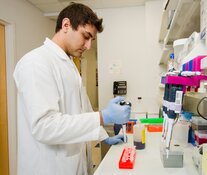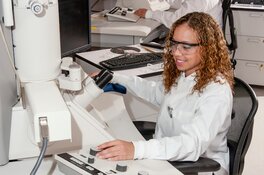Rakovina Therapeutics Inc. (RKV:TSX.V), a biopharmaceutical company focused on AI-enabled cancer therapies, announced that its common shares are now eligible for electronic clearing and settlement through The Depository Trust Company (DTC), a subsidiary of the Depository Trust & Clearing Corporation (DTCC). This eligibility streamlines trading for U.S. investors by allowing Rakovina's shares to be processed electronically, thereby reducing costs and improving transaction efficiency.
The DTCC is the world's largest securities depository and provides settlement services to major U.S. exchanges. With this designation, Rakovina aims to improve share liquidity and broaden its investor base in the United States. Executive Chairman Jeffrey Bacha stated in the news release, "Achieving DTC eligibility is a meaningful step forward in increasing Rakovina's visibility and accessibility to a broader base of institutional and retail investors." He noted the update eliminates key trading barriers in the U.S. and supports engagement with capital markets.
The development aligns with the company's ongoing growth strategy, which includes advancing a portfolio of preclinical oncology programs that use proprietary artificial intelligence platforms to target DNA-damage response pathways. The company is based in Vancouver, British Columbia.
AI Integration in Oncology Highlights Growing Relevance for Drug Discovery Platforms
Recent developments in artificial intelligence (AI) have underscored its growing role in reshaping cancer diagnostics, treatment planning, and clinical workflows—an area directly aligned with Rakovina Therapeutics' AI-powered approach to drug discovery. On July 5, Oncology published insights from Dr. Julie M. Vose, MD, MBA, who detailed the integration of AI tools into multiple stages of cancer care. She cited the performance of AI models such as CHIEF, which demonstrated 96% accuracy across a range of cancer subtypes using 15 million histopathology images. According to Dr. Vose, the ability of AI to infer tumor biology ahead of molecular sequencing can streamline therapy decisions and enhance treatment personalization. She also noted that AI was proving useful in simplifying case summaries and improving clinical trial matching, although she pointed out that privacy concerns and the need for legal frameworks continued to present implementation challenges.
Supporting this trend, a July 9 article by Mount Sinai Hospital highlighted a Nature Medicine study showing that AI could identify EGFR gene mutations in lung adenocarcinoma using only standard pathology slides. The lead researcher, Dr. Gabriele Campanella of the Icahn School of Medicine at Mount Sinai, explained that the findings suggest genetic insights can be extracted without additional testing, potentially preserving biopsy material for broader genomic analysis. In a concurrent real-time test at Memorial Sloan Kettering Cancer Center, AI predictions were successfully run alongside standard workflows, demonstrating reliable results. Dr. Alexander Charney added that the true value of AI lies not just in time savings, but in the future potential to discover novel biomarkers using existing clinical materials.
Further emphasizing AI's impact in practice settings, The American Journal of Managed Care published a panel discussion on July 10 from Tennessee Oncology's "Tech Innovations in Community Oncology" forum. Dr. Lalan Wilfong remarked that AI could eventually help physicians validate that all clinical data has been considered, potentially accelerating research and decision-making. His co-panelist, Dr. Ravi Parikh, underscored the need for AI tools to go beyond probability scores and deliver actionable therapeutic insights. However, both panelists noted ongoing limitations in toxicity prediction due to gaps in real-world data collection, particularly for lower-grade adverse events. Despite such challenges, they concluded that with proper clinical training, AI has the potential to support more informed and timely decisions in oncology care.
Strategic Pipeline and AI Integration
Rakovina Therapeutics is developing next-generation cancer treatments through its integration of artificial intelligence and drug discovery. The company's drug development model centers on the Deep Docking and Enki platforms, which enable rapid screening of billions of molecules to identify candidates targeting DNA-damage response (DDR) pathways. DDR defects are present in approximately 75% of all solid tumors, creating broad therapeutic potential.
According to Rakovina's Q3 2025 investor presentation, the company's current pipeline includes AI-generated selective inhibitors for PARP-1 and ATR, two enzymes involved in DNA repair. The kt-2000 series, including a PARP-1 selective inhibitor designed for brain-penetrant therapies, is in preclinical stages. The kt-5000 series includes an ATR inhibitor also optimized for central nervous system penetration. Both are intended for use in cancers resistant to earlier-generation treatments.
The company's in-house validation capabilities, established in partnership with the University of British Columbia, allow for accelerated advancement of drug candidates. The investor materials show that early-stage results from these programs are expected to feed into future partnering discussions with pharmaceutical companies.
Rakovina also reported that it maintains full rights to any novel drug candidates generated through its AI collaborations. The company's scientific advisory board, which includes experts in AI-driven drug development and oncology research, oversees its research initiatives.
Analysts Cite AI Capabilities and Operational Milestones
On April 2, First Berlin Equity Research analysts Alexander Rihane and Christian Orquera initiated coverage on Rakovina Therapeutics with a Buy rating and a target price of CA$0.40 per share. Their report emphasized the company's Deep Docking AI platform, noting its previous real-world use during the COVID-19 pandemic. The platform was credited with identifying 1,000 candidate compounds in under four weeks, one of which became the active pharmaceutical ingredient in the antiviral drug Paxlovid. The analysts also highlighted upcoming milestones, including planned presentations of AI-derived compound validation data at the American Association for Cancer Research (AACR) Annual Meeting in April. The CA$0.40 valuation was based on a sum-of-the-parts model using a risk-adjusted net present value approach and reflected a 300% premium to the CA$0.10 share price at the time of publication.
Additional commentary was provided on June 6 by Dr. Douglas Loe of Leede Financial Inc. in a weekly research note following Rakovina's Q1 2025 financial results. Dr. Loe stated that the company's CA$4 million equity financing was approaching completion and projected that pro forma cash levels would likely exceed the CA$100,000 reported at the end of the quarter.
Dr. Loe also referenced Rakovina's research and development expenditures of CA$900,000, noting alignment with its AI-based drug discovery initiatives conducted in partnership with the University of British Columbia and Variational AI. He observed that the company continued its focus on small molecule discovery targeting PARP1 or PARP2 alongside DNA repair pathways such as ATR. According to Dr. Loe, this approach is consistent with strategies seen in other cancer drug programs at the Phase 2 stage of development.
 Streetwise Ownership Overview*
Streetwise Ownership Overview*
Rakovina Therapeutics Inc. (RKV:TSX.V)
Ownership and Share Structure
Edison Oncology owns 12% of Rakovina Therapeutics.
Management and Reporting Insiders own 4%, with the top two being Jeffrey Bacha and Alfredo De Lucrezia.
The rest is friends/family and retail.
Rakovina Therapeutics recently announced a 10:1 share consolidation, effective on June 24, 2025.
This means that for every 10 pre-consolidation common shares, shareholders now hold one post-consolidation common share.
Rakovina Therapeutics Inc. has 21 million shares outstanding and a market capitalization of approximately CA$14.569 million. Over the past 52 weeks, its stock has traded between CA$0.40 and CA$2.30.
| Want to be the first to know about interesting Biotechnology / Pharmaceuticals investment ideas? Sign up to receive the FREE Streetwise Reports' newsletter. | Subscribe |
Important Disclosures:
- Rakovina Therapeutics has a consulting relationship with Street Smart an affiliate of Streetwise Reports. Street Smart Clients pay a monthly consulting fee between US$8,000 and US$20,000.
- As of the date of this article, officers and/or employees of Streetwise Reports LLC (including members of their household) own securities of Rakovina Therapeutics
- James Guttman wrote this article for Streetwise Reports LLC and provides services to Streetwise Reports as an employee.
- This article does not constitute investment advice and is not a solicitation for any investment. Streetwise Reports does not render general or specific investment advice and the information on Streetwise Reports should not be considered a recommendation to buy or sell any security. Each reader is encouraged to consult with his or her personal financial adviser and perform their own comprehensive investment research. By opening this page, each reader accepts and agrees to Streetwise Reports' terms of use and full legal disclaimer. Streetwise Reports does not endorse or recommend the business, products, services or securities of any company.
For additional disclosures, please click here.







































